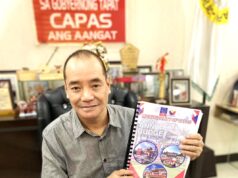NOVEMBER 27 is Araw ng Pagbasa (Day of Reading), the highpoint of the celebration of November as National Reading Month. A most appropriate day to publish anew – the first time only last April – this yet another advancement of my advocacy, aye, expression of my passion for reading. And a necessity too as advancer for this space, given that I will most probably be in Japan by the time this is published.
THE SUN, the sea, the sand – and a book. My own summer fun. The book though goes beyond the chaise lounge under some shady coconut palm and presents itself at the bedside table, study desk, bathroom shelf, staircase, office desk, car seat, bag, wherever I happen to be.
No mere summer fare, reading has become essential to my living, aye, to my being. The voracious reader Ding Cervantes preaches the convenience of the tablet with its vast library of e-books, adjustable fonts, lightness of weight over the old hardbounds and paperbacks. No tech-savvy like Ding, I prefer my books as they are – the smell of pulp actually an inducement to read, a stimulant to greater understanding, indeed, to internalizing both spirit and letter of the book.
To each his own preference, reading is its own reward anyways. Comes to mind Francis Bacon’s Of Studies, thus: “Read not to contradict and confute; nor to believe and take for granted; nor to find talk and discourse; but to weigh and consider.”
Impacted during my formative years at the Mater Boni Consilii Seminary, the best of Bacon’s Essays has since served as my reading beacon. In the choice of books, he cautions: “Some books are to be tasted, others to be swallowed, and some few to be chewed and digested; that is, some books are to be read only in parts; others to be read, but not curiously; and some few to be read wholly, and with diligence and attention.”
Many times, a cursory browse of the teaser or gist on the flaps is all it takes to “taste” the book and finding it unsavoury promptly return it to the shelf. Of the great finds – I read “wholly with diligence and attention” and re-read with greater diligence and interest. Sun Tzu’s Art of War, Machiavelli’s The Prince, The Confessions of St. Augustine, The Communist Manifesto, Pablo Neruda’s 20 Love Poems are among the most prized of my some 1,000 books.
It is to Bacon too that I owe this habit of reading three books at every sitting, categorized to heavy, light and inspirational. Currently I am into the thick of Fidel Castro’s spoken autobiography My Life, the atheist Chris Hitchens’ god is not Great subtitled How Religion Poisons Everything, and Paulo Coelho’s Manuscripts found in Accra.
Earlier were American Lion of Andrew Jackson’s years in the White House, a re-read of William Safire’s The First Dissident subtitled The Book of Job in Today’s Politics, and, to be finished yet, Barbara Tuchman’s A Distant Mirror subtitled The Calamitous 14th Century. For inspirational, restful intermissions – from all the heavy reading – Rabindranath Tagore’s Gitanjali, the poems of Rumi, and the Dhammapada, the Buddha’s Path of Wisdom I find most calming.
In the wake of Putin’s audacity (mis) addressing the crisis in Crimea, I am dusting off a biography of Stalin and the history of the Crimean War with Tennyson’s The Charge of the Lighjt Brigade on the side. Still remember, “…theirs not to make reply, theirs not to reason why, theirs but to do and die: into the valley of death rode the six hundred…”? Obvious by now my preferred reads: history and biography, philosophy and poetry, morality and religion. Again, in submission to Bacon:
“Histories make men wise; poets witty; the mathematics subtle; natural philosophy deep; moral grave; logic and rhetoric able to contend.” Alas, the last fling I had with mathematics was in third year high school trigonometry. The only connection to the subject now exclusive with my Tokyo-based actuarial specialist son Jonathan. Wise. Witty. Subtle. Deep. Grave.
Not only able to contend but contentious even. The fruits of reading, the very requisites to writing. One who rarely reads but appends “writer” to his name is no more than a pompous pretender then. Not unlike the idiot who thinks anyone who can read his mail is a man of letters. Bacon, fittingly: “Reading maketh a full man; conference a ready man; and writing an exact man.
And therefore, if a man write little, he had need have a great memory; if he confer little, he had need have a present wit: and if he read little, he had need have much cunning, to seem to know, that he doth not.” So I read. So I write. So I am.




